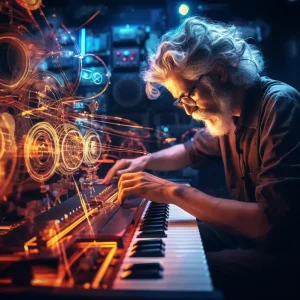
Using AI Tools in Music we will explore how AI is transforming music creation
Artificial Intelligence has been revolutionizing various industries, and the world of music is no exception. Musicians, composers, producers, and even enthusiasts are increasingly harnessing the power of AI tools in music to enhance their creativity, streamline their workflow, and discover new possibilities in the realm of music. In this article, we will explore how AI is transforming music creation and production, and we will delve into three remarkable AI tools that people can use to augment their musical endeavors.
The AI Revolution in Music
The integration of AI tools in music is a significant paradigm shift. It not only accelerates the creative process but also democratizes music production. Here are some ways AI is making waves in the world of music:
1. Music Composition and Generation
One of the most compelling applications of AI in music is its ability to compose and generate music autonomously. AI algorithms, often based on deep learning neural networks, have been trained on vast datasets of music from various genres and eras. These algorithms can then produce original compositions, often indistinguishable from those created by human musicians.
Amper Music
Amper Music is an AI-powered music composition tool that allows users to create original music in minutes. Users can choose from a range of musical styles, instruments, and moods, and Amper generates a unique composition accordingly. It has been used in various professional productions, including commercials and video games, showcasing the potential of AI in music composition.
2. Music Production and Mixing
AI tools are also transforming the production and mixing phases of music creation. These tools can assist in tasks such as audio enhancement, vocal tuning, and even suggesting instrument combinations for a more balanced sound.
LANDR
LANDR is an AI-driven platform that offers automated mastering and music production services. Musicians and producers can upload their tracks,
and LANDR applies a suite of AI algorithms to enhance the audio quality, optimize the mix, and even generate variations for experimentation. This tool enables musicians to achieve professional-quality sound without the need for an extensive studio setup.
3. Music Recommendation and Discovery
AI has played a pivotal role in the way we discover and consume music. Streaming platforms like Spotify and Apple Music leverage AI to curate personalized playlists and recommend songs based on user preferences. These platforms analyze user behavior, such as listening history and liked tracks, to provide a tailored music experience.
Pandora
Pandora, a well-known internet radio service, utilizes the Music Genome Project—a vast database of musical characteristics and traits—to recommend songs and artists to its users. AI algorithms categorize songs based on attributes like tempo, key, instrumentation, and lyrics, ensuring that users receive music that aligns with their tastes.
Advantages of Using AI Tools in Music
The adoption of AI tools in music offers several significant advantages:
Efficiency
AI tools can significantly expedite various aspects of music creation and production. Composing, mixing, and mastering music manually can be time-consuming and technically challenging. AI tools automate these processes, allowing musicians to focus more on their creativity.
Accessibility
AI tools democratize music production by making it more accessible to a wider audience. You don’t need an expensive studio or formal training to create high-quality music with AI assistance. This opens up opportunities for aspiring musicians and producers worldwide.
Creativity Enhancement
AI tools can provide valuable inspiration and creative suggestions. They can propose chord progressions, melodies, and instrument combinations that a human musician might not have considered, pushing the boundaries of musical experimentation.
Consistency
AI tools can ensure consistency in music production. When mastering a full album, for example, AI can maintain a uniform sound quality across all tracks, eliminating discrepancies that might arise during manual processing.
Challenges and Ethical Considerations of AI tools in Music
While AI in music offers numerous benefits, it also presents some challenges and raises ethical questions. For instance:
Originality
There’s a debate about whether AI-generated music can be considered truly original. Critics argue that since AI models learn from existing music, the compositions they generate may lack genuine creativity. This sparks discussions about copyright and intellectual property.
Human Relevance
AI tools can aid in music composition, but they lack the emotional depth and human experiences that often inform human-created music. The question arises: Can AI ever replicate the emotional resonance of a human composition?
Job Displacement
As AI takes over certain music production tasks, concerns arise about potential job displacement in the music industry. However, proponents argue that AI can be a valuable collaborator, freeing up artists to focus on more creative aspects of music-making.
Conclusion
AI tools have firmly established their presence in the world of music, offering musicians, producers, and music enthusiasts powerful resources to enhance their work. Whether it’s composing original music, improving production quality, or discovering new tracks, AI is redefining the music landscape.
As AI technology continues to advance, it will be exciting to witness how musicians and the industry as a whole adapt and evolve. While challenges and ethical considerations remain, the creative potential of AI in music remains vast and promising. Ultimately, the synergy between human creativity and AI tools in music assistance may lead to new musical horizons that were previously unimaginable.






